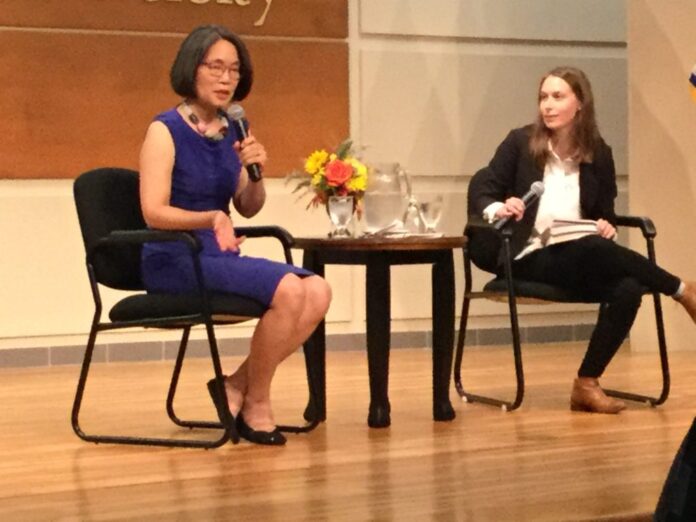

More than a decade after leaving St. Thomas with a journalism degree and experience as The Aquinian’s news editor, Karissa Donkin is finally fulfilling a career dream of becoming a hockey reporter.
“It was surreal,” Donkin said of the recent Toronto-Montreal PWHL game that broke the attendance record for a women’s hockey game. She added that the lineups for the women’s washrooms were much longer than at a men’s game.
Related: Battle on Bay Street sets attendance record for women’s hockey game
As she looked around from the press box, she couldn’t see an empty seat at Toronto’s Scotiabank Centre.
“People were there to cheer on and be fans,” she said. “They weren’t there as part of a business meeting or something.”
“I think for everybody who’s followed women’s hockey it was a bit of an emotional moment,” said Donkin, who grew up a Leafs fan in Saint John’s south end.
“It was definitely an emotional pinch-me moment for me.”
After graduating and doing internships at the Toronto Star and Telegraph-Journal, Donkin had settled in at CBC’s Atlantic Canada investigative unit. It wasn’t until the pandemic that the Fredericton-based reporter figured out a way to scratch that itch of hers to cover hockey.
“I needed a project, I needed something to do,” she said. “Maybe something that’s very different from what I was doing day to day from my job.”
Donkin latched onto the idea of writing a book on women’s hockey and following a team throughout a season, reporting on the ups and downs.
“I’ve always loved women’s hockey and there aren’t very many books about women’s hockey out there,” she added.
With only the hope of a book contract, she forged ahead on her own time and budget, covering the now-defunct Canadian Women’s Hockey League.
“At the time, there weren’t many reporters there,” she said. “The (players) were really eager to tell their stories and what they’ve been through.”
The women are very articulate, said Donkin, and usually have university degrees.
“They’re very smart, not to say the men’s hockey players are not, but they don’t speak in clichés, right?”
She added, “for the most part, everybody is super engaging and they want to talk to you.”
While her focus is currently on women’s hockey, she credits her own curiosity for forging her career and her ultimate path. Even before she entered the STU journalism program, she’d started a blog looking at poverty.
“It’s good to be diverse and to try different things. And to just be a good reporter first before you even think about, ‘I only want to cover this specific topic,’” she told a second-year journalism class in late February.
“It’s good to be curious.”
